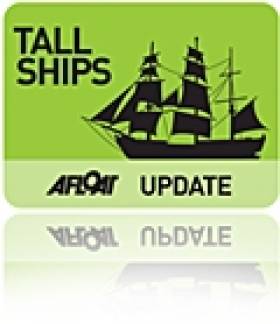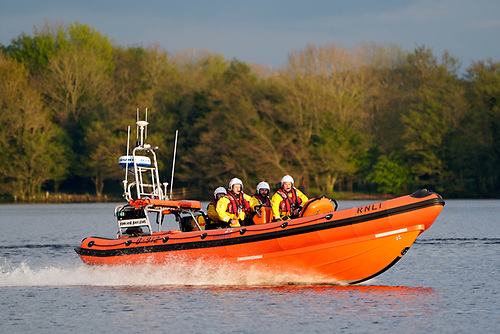Displaying items by tag: Nigel Rowe
€10,000 Tall Ships Bursary for Irish Sailing Trainees
A new sailing body that claims it will ensure the continuation of the long standing Irish Tall Ships maritime tradition of youth sail training was launched at a ceremony in Dublin Port this afternoon.
The newly established Sail Training Ireland for Youth Development (STIYD) was officially launched by Nigel Rowe, President and Chairman of Sail Training International.Following the sinking of the Asgard II and the decision to wind up Coiste An Asgard, the future of sail training in Ireland had been uncertain but STIYD will now ensure the continuation of the long standing Irish maritime tradition. More Asgard II News.
At the launch Nigel Rowe also announced that Sail Training International had awarded STIYD with a bursary of €10,000 to help fund the participation of young Irish trainees in The Tall Ships Races 2011. Mr. Rowe remarked "It is wonderful to see Sail Training Ireland for Youth Development emerge from all the uncertainties and anxieties that followed the demise of Coiste an Asgard. The commitment and enthusiasm of the people who have made this happen will ensure its success, and they will have the full support of the international sail training community. With Waterford as a host port for this year's Tall Ships Races we have already committed more than €10,000 to help fund the participation of young Irish trainees."
The aims and objectives of Sail Training Ireland are to promote the development and education of young men and women through the Sail Training experience regardless of nationality, culture, religion, gender or social background as well as to sponsor and support sea-going trainees. Sheila Tyrrell, Chair of the steering group, who has a long history with sail training and in particular the Asgard remarked "We are delighted that we are in a position to formally launch the association, we are now taking applications for bursaries to allow young people to participate in the Tall Ships Race visiting Waterford later this year, and are also recruiting a manager to help manage the affairs of the association."
Also in attendance at the launch was Mr. Clayton Love Jnr., founding member of Coiste An Asgard and former President of the ISA. During the afternoons formalities Mr. Love Jnr. was officially awarded Honorary membership of STIYD in recognition of his outstanding contribution to sail training in Ireland.
Sail Training Ireland is also seeking to appoint a part-time manager to help with the development of a business plan and the day to day running of the organisations affairs. Further information on the position and a full job description can be found on the STI website www.irishsailtraining.com. Closing date for applications is Friday 22nd April.
The launch, sponsored by Arklow Shipping, was hosted by Dublin Port who are one of a number of ports supportive of the project.
All the latest Tall Ships News from Ireland.
Back from the deep. Should Asgard's bell ring out in Waterford? You decide. Poll.
Will Sail Training Be Restored?
I am glad to see that efforts are being made to restore the national sail training programme, but less sanguine about reposing any confidence in the present Government to give practical assistance.
I talked a few weeks ago with the Irish Sailing Association's Chief Executive about their involvement in moves to establish a new sail training organisation to replace Coiste an Asgard, which the Government abandoned. Harry Hermon told me that the ISA had been examining the possibilities of what could be done. They were providing a forum which has now led to the setting-up of a steering group aimed at establishing a new organisation, Sail Training Ireland.
Sail Training International which organises the Tall Ships Races has given support. The Tall Ships Race will start from Waterford Port next year and is due into Dublin in 2012.
Nigel Rowe, Chairman of the international body, has expressed confidence that the current moves will result in a plan to continue sail training in Ireland. Sail Training International has awarded a bursary to the emerging Irish organisation, providing financial support for young Irish sailors in the 2011 and 2012 races.
The ISA working group says it will make a formal launch of its plans in the next few weeks. At present it is putting together a feasibility study and a business plan which will be presented to the Government in the New Year.
While the ISA move is welcome, I wonder about the value of presenting a plan to the existing Government which destroyed sail training, abandoned Asgard II on the seabed off France and used the insurance compensation money for purposes other than sail training.
I understand that other groups, who may differ with the ISA approach, have been planning their own moves in sail training and that the ISA decided to establish its position in public first.
It also has to be noted that there was criticism of the former Coiste an Asgard committee which did not make any moves in public to oppose the Government closure, on financial grounds, of the sail training programme.
It would be regrettable if differences delayed positive developments, but a united approach, involving the widest possible support to the restoration of sail training would be best.
• This article is reprinted by permission of the EVENING ECHO newspaper, Cork, where Tom MacSweeney writes maritime columns twice weekly. Evening Echo website: www.eecho.ie
New Organisation Announced for Sail Training in Ireland
A sailing initiative aimed at Irish participation in next year's Tall Ships Races in Waterford has been announced by a newly formed national organisation Sail Training Ireland.
Since the sinking of the Asgard II and the decision to wind up Coiste An Asgard, the Irish Sailing Association (ISA) has been facilitating a steering group with the aim of establishing 'Sail Training Ireland'.
The steering group has been working with Sail Training International to establish a sustainable organisation that will work with training providers and host ports to build Ireland's Sail Training Programme in the future.
The Tall Ships Race that visited Belfast last year is due to return to Waterford in 2011 and Dublin in 2012 is clear recognition by the race organisers of Ireland's popularity as a destination, and a credit to the host ports who are able to facilitate such a great occasion.
The working group are preparing for the launch of Sail Training Ireland in a few weeks and are currently putting together a feasibility study and business plan for the organisation that may be presented to the Minister in the New Year.
Sail Training International has awarded a bursary to Sail Training Ireland which will provide funding to support the participation of young people in The Tall Ships Races 2011 and 2012.
"The small group that has been working on this will put together a sensible, practical but ambitious plan to ensure the legacy of Coiste an Asgard...." explains Nigel Rowe, Chairman of Sail Training International, "....it will enable Irish youth to continue to benefit from the sail training experience".
Sheila Tyrrell, Chair of the steering group, who has a long history with sail training and in particular the Asgard remarks "The bursary from Sail Training International is very welcome and endorses the credibility of our plans to re-establish a national sail training programme. The steering group will be in a position to effect the launch of Sail Training Ireland this side of Christmas."
Looking for further reading on Tall Ships in Ireland? Click the links below:
Click this link to read all our Tall Ships Stories on one handy page
Previewing Ireland's Tall Ships 2011 Season
Can Ireland Get a New Tall Ship?





























































